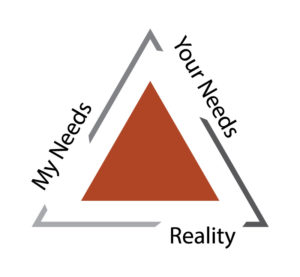
July 8, 2018
People often use the word “boundaries” without knowing exactly what a boundary is. Or they think a boundary is a wall. Not necessarily. That’s all I’m going to say about walls today!
My favorite definition is that boundaries are internal understandings that help us love each other better. So you see, boundaries are not just to keep people or things out. They can also help us decide what to invite in. And how to interact with it when we do.
Here’s one way to increase the health of our boundaries so that we can love each other better.
THE TRIANGLE
Refer to the triangle when making decisions about what you want to say or do:
The triangle represents three elements to consider when making a decision affecting us in relationship with each other.
One side represents my needs, the opposite side represents your needs (and the needs of everyone else involved), and the bottom, the base, represents reality.
Healthy boundaries include a respect for reality. Any time we ignore, or even argue with reality, we will lose, 100% of the time.
You probably tend to lean toward one or two sides of the triangle over another. And every decision that you make without considering all three sides can be incomplete, and sometimes catastrophic in the outcomes.
MY NEEDS:
Some of us tend to think about ourselves and forget that we may be hurting someone else with our decision.
For example, we’re having dinner together. I want fish for dinner and fish makes you gag. My position would be that’s your problem and if you loved me you’d eat fish. (See a boundary problem there?)
YOUR NEEDS:
Others may try to please everyone else and forget about ourselves.
Example: You hate fish and everyone else wants it, and they will never know that it makes you gag because all that matters is that you keep them happy. Boundary?!
REALITY:
Some of us ignore reality in making a decision. When that happens, I can almost guarantee it will come back later to bite us in the butt. In both of the previous cases reality was pretty much out the window. In one case the reality of someone else’s preferences was ignored, and in the second, the reality of your own reaction and needs was discounted.
A bonus is that when I stop long enough to use the triangle, I like myself better. Even if I don’t make everyone happy, and even if I don’t always get my way, somehow I feel closer to whoever is involved. Boundaries are not a wall, per say, but a juggling of yours and other’s needs.
Your thoughts?
Much love,
